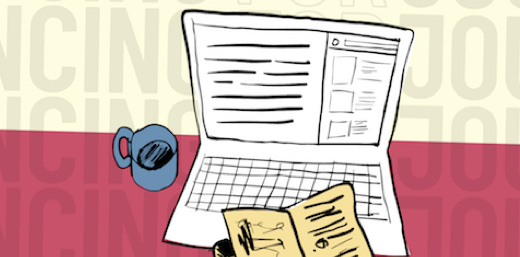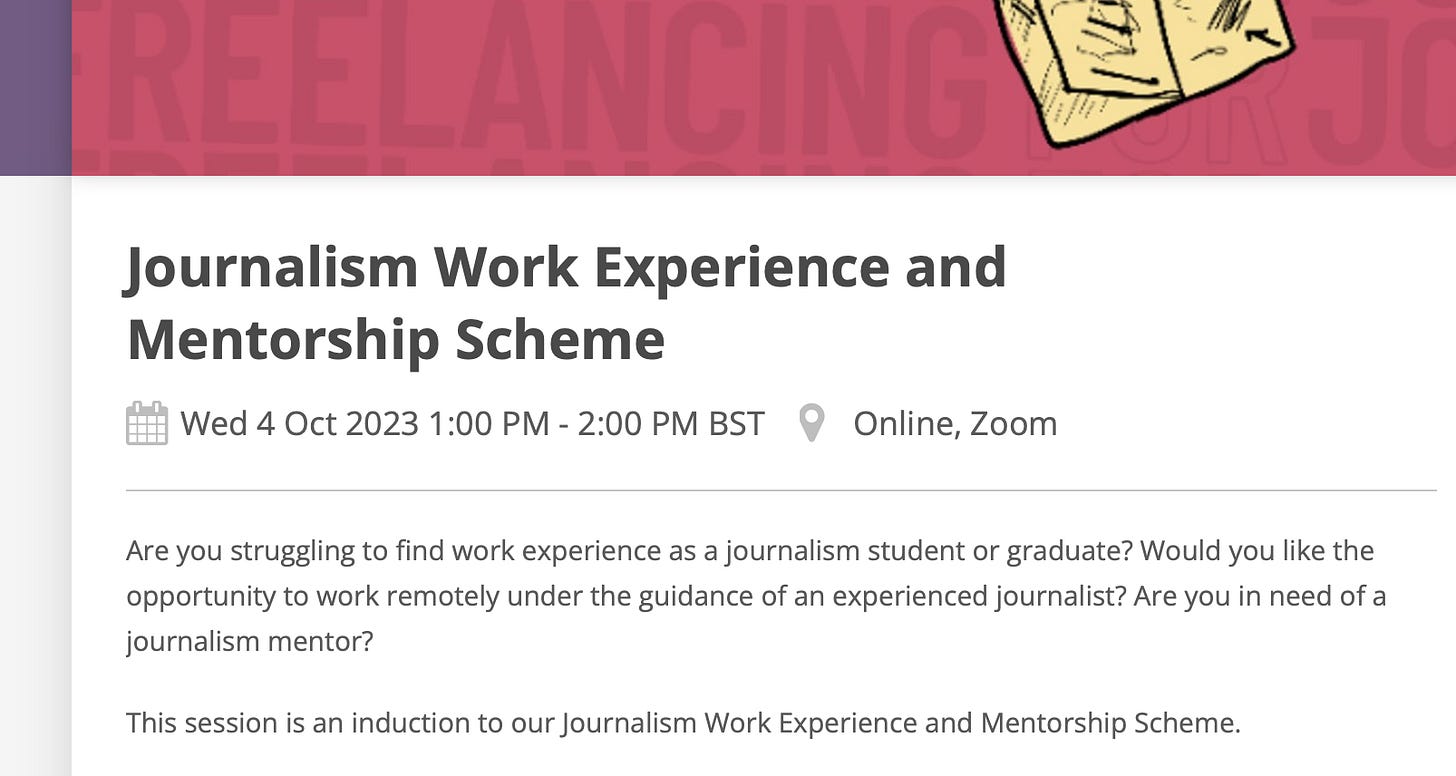How do remote freelance internships work?
What freelance journalists can offer those looking for work experience
We have just launched the next round of our Journalism Work Experience and Mentorship Scheme (more details at the end of the newsletter) so it goes without saying we are big advocates of freelance journalists offering placements to those learning the trade.
This approach differs quite a bit from the traditional work experience option of going into a newsroom and making cups of tea or even (this was me) having to fill gaps in a short-staffed office and very quickly being thrown in the deep end.
Freelancing is more popular than ever before. So it makes sense that those of us who work for ourselves are included in the training and mentoring of the next generation. What that looks like in practice varies widely and on our scheme this is something to be agreed between the journalist and mentee - but it can essentially be whatever you want it to be.
In our guest newsletter this week we hear from Amelia Groom, a student at the University of Plymouth and Environmental Journalist Anna Turns about how it worked for them.
‘If you never ask, you’ll never know’
I have always wanted to write. Every career I have imagined throughout my life has always come back to writing. It is the thought of being a voice for others through my words that attracts me to journalism. When I was able to choose a placement module as a part of my degree, I knew I wanted it to be in journalism and after searching for environmental journalists, Anna came up first each time.
I pre-emptively told myself that such an established journalist wouldn’t respond to me but before I knew it, I was an intern and had my foot in the door of my dream career.
Not only was my placement successful in many ways it exceeded my expectations. In just three months of working with Anna, I learned a multitude of journalistic skills that I will take forward. Although most of the placement was remote, I always had something to be working on whether it was assisting in interviews, researching, or transcribing. I was always busy and learning something new.
Before my placement, I felt slightly lost in the overbearing question that is ‘What happens after university?’ If someone had told me three months ago that I would now be a published journalist with my own article, I wouldn’t have believed them. Having Anna there to support and push me to achieve my goals was a big part of my success.
Not only did my placement give me the experience I needed for my degree, but it also gave me a career mentor who I know will be there to support my options after university and hopefully throughout my career. The placement also reassured me of the career I want after university. I know I want to work in environmental communications to be a voice for others, to be a part of the change, and to make people more environmentally conscious through my writing.
I have learned a lot from my this experience and I would recommend anyone wanting to take the leap to send the email or make the call because if you never ask, you’ll never know.
‘I was SO proud of her when she got her first commission’
When Millie first contacted me inquiring about work experience placements, my initial thought was ‘no, I’m a freelancer, she needs a newsroom or a magazine publisher’. But I clocked two things in her email that made me think twice. Firstly, she knew my work really well – she’d done her research. Secondly, she seemed really keen – not gushing with fake enthusiasm but her interest was authentic. And so began our internship together.
Most of our interactions were remote – through Zoom, phone calls, emails - but we also met up in person twice. She attended a talk I gave to marine scientists in Plymouth about my solutions-focused journalism and she travelled with me to Cardiff for a behind-the-scenes visit to the Royal Mint for a BBC Future story. That alone involved six hours of travel time so we discussed journalism, her ambitions and future opportunities, and also enjoyed getting to know each other.
With a deeper understanding of her passions, I encouraged Millie to develop her pitching skills. She pitched her most promising feature idea and I was SO proud of her when she got her first commission.
Because this was a freelance and remote set-up, there was no defined structure, making this internship all the more unknown for both of us. We were both clear about specific goals and expectations from the start – we had to fill in a form for Plymouth University to this effect but I would recommend this anyway. I regularly checked in with Millie to make sure everything I was asking her to do was useful and informative – she sat in lots of Zoom interviews and helpfully transcribed some of them too, plus did lots of background research, joined me on Zoom as I went through amends from editors, and she saw various features through from pitching to publication.
I also used my experience as a journalism lecturer to set her tasks that made her think about niches or her LinkedIn profile for example, and always made sure I gave constructive feedback. In return, it became a really productive collaboration and I think – I hope – we both gained a lot from it.
Officially, our internship has ended, but we continue to stay in touch, and I’m looking forward to seeing what comes next for Millie.
What’s on
If that has inspired you, then take a look at our Journalism Work Experience and Mentorship Scheme which starts again on the 4th October. Anyone can sign up and after the induction you will have access to our database of remote work experience and mentorship opportunities.
Learn from experienced journalists across the globe how to research, interview, write and promote content by signing up to the scheme and taking part in this online briefing. It costs £10 to cover our admin fee but you have access for a full year and can do as many placements as you like. Any questions about it (or to learn more about our bursary places), please email freelancingforjournalists@gmail.com
Please note in previous years this has filled up really quickly so if you want a spot, don’t delay and grab your place. Also, if you’re a journalist interested in offering a remote placement do get in touch, we’re always happy to hear from you!
Triumph of the week
Cleaning the office (the cobwebs were out of control)
That feeling when
An editor says your invoice has been processed but it’s still tumbleweed in your bank account
We love to hear your feedback on everything we do, so feel free to drop us an email anytime at freelancingforjournalists@gmail.com
Bye for now!










A most helpful read. As a student journalist from Nigeria, I have often struggled with getting remote placement in the past. Hopefully this will be helpful in my journey. Thank you very much for this article.
How can I contact Amelia Groom? I'm interested in a possible opportunity to be on a podcast